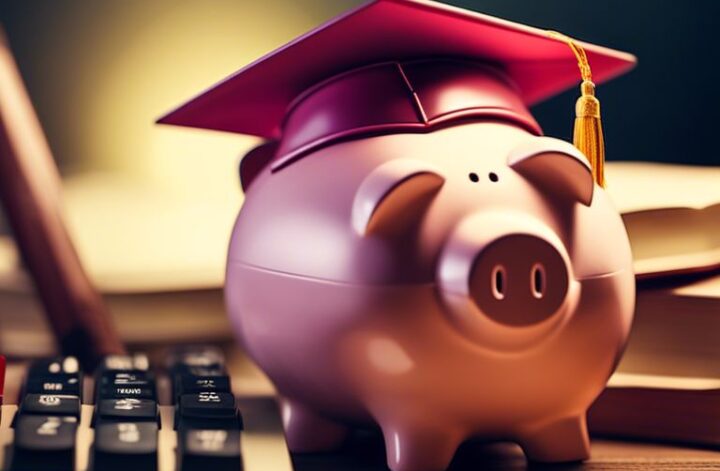Debt-free. A concept that may seem like a distant dream for many individuals burdened with student loan debt. As education costs continue to rise, more and more graduates are facing the daunting task of repaying substantial amounts of money. In this blog post, we will explore real-life scenarios of individuals tackling student loan debt head-on and discuss strategies for repayment and achieving financial freedom. By implementing these strategies, you can pave the way towards a debt-free future and take control of your financial well-being.
Foundation of Loan Repayment Planning
Assessing Your Financial Landscape
A crucial first step in tackling student loan debt is to assess your current financial situation. Take stock of your total loan amount, interest rates, repayment terms, and monthly payment obligations. Understanding these key factors will enable you to create a realistic repayment plan tailored to your financial capabilities. Additionally, evaluate your income, expenses, and other financial obligations to determine how much you can comfortably allocate towards loan repayment each month.
Establishing Clear Repayment Objectives
To successfully pay off your student loans, it’s vital to establish clear repayment objectives. Determine whether you aim to aggressively pay off your debt to minimize interest accumulations or prioritize making consistent, manageable payments over an extended period. Set specific goals such as target payoff dates, desired monthly payment amounts, and milestones to track your progress. By establishing clear objectives, you can stay focused and motivated on your journey to financial freedom.
Repayment Strategies
Any individual burdened by student loan debt knows the importance of finding effective strategies to pay off their loans faster. If you are looking for concrete tips and advice on how to tackle your student loan debt, check out Strategies to Pay Off Student Loans Faster | by Don Diamonté for insightful guidance.
Standard Repayment Plans
With standard repayment plans, borrowers pay a fixed amount each month for a set period of time, typically 10 years. This is the most straightforward method and can help individuals stay on track with their payments, ultimately leading to paying off their debt faster.
Income-Driven Repayment Plans
One popular option for borrowers struggling to meet their monthly payments is income-driven repayment plans. These plans adjust your monthly payment based on your income, making it more manageable for those with lower salaries or fluctuating incomes. It’s important to note that while these plans can lower your monthly payment, they may extend the repayment period, resulting in more interest paid over time.
Understanding
Refinancing Options
It’s important to explore refinancing options if you want to lower your interest rates and potentially save money over the life of your loan. By refinancing your student loans, you can secure a new loan with better terms, such as a lower interest rate or a shorter repayment period.
Plans
Loan Forgiveness Programs
Forgiveness
For borrowers working in certain fields like public service or nonprofit organizations, loan forgiveness programs can offer a path to debt relief. These programs forgive a portion or all of your remaining student loan balance after a specified number of qualifying payments or years of service.
Standard

Budgeting Techniques for Effective Debt Management
Once again, creating a budget is crucial when it comes to managing and paying off student loan debt. By tracking your income and expenses, you can identify areas where you can cut back and allocate more funds towards repayment. This proactive approach will help you stay on track and reach your debt-free goals faster.
Creating a Budget to Accelerate Loan Repayment
Any successful debt repayment plan starts with creating a budget. Start by listing all your sources of income and fixed expenses, such as rent, utilities, and groceries. Next, allocate a certain amount towards your student loan payments each month. By prioritizing loan repayment in your budget, you can make consistent progress towards reducing your debt burden.
Cutting Expenses and Increasing Income
Cutting expenses and increasing income are imperative strategies for accelerating loan repayment. Look for ways to reduce discretionary spending, such as dining out or shopping, and redirect those funds towards paying off your student loans. Additionally, consider taking on a part-time job or freelancing gigs to increase your income and make larger payments towards your debt.
Understanding your financial situation and making conscious decisions to prioritize debt repayment will set you on the path towards financial freedom. By implementing budgeting techniques and being proactive about reducing expenses and increasing income, you can effectively manage your student loan debt and work towards a debt-free future.
Prioritization and Allocation of Payments
To effectively tackle your student loan debt, it is crucial to prioritize and allocate your payments strategically. By understanding different repayment methods and their potential impact, you can make informed decisions to expedite your journey towards financial freedom.
The Snowball vs. Avalanche Methods
Allocation of payments between different loans can be approached in various ways. The Snowball method involves paying off the smallest balance first, while the Avalanche method focuses on tackling the loan with the highest interest rate. Consider your financial situation and goals to determine which approach suits you best. While the Snowball method may provide psychological motivation by clearing off smaller debts quickly, the Avalanche method can save you more money in the long run by minimizing interest payments.
The Impact of Extra Payments
Allocating extra payments towards your student loans can significantly reduce the total interest paid over time and shorten the repayment period. Even a small additional amount each month can make a substantial difference. For example, by making an extra payment of $50 a month on a $30,000 loan with a 6% interest rate, you could save over $4,000 in interest and repay the loan almost two years earlier.

Psychology of Debt and Staying Motivated
Emotional Aspects of Debt Repayment
Many individuals carrying student loan debt experience a range of emotions, including stress, anxiety, and even shame. It’s important to acknowledge these feelings and address them head-on to stay motivated on the journey towards financial freedom. Remember that you are not alone in this struggle – millions of people are in the same boat, and there is a light at the end of the tunnel. Seek support from loved ones or a financial advisor to help navigate these emotions and stay focused on your debt repayment goals.
Setting Milestones and Celebrating Progress
For debt repayment to feel manageable and rewarding, it’s crucial to break down your total loan amount into smaller, achievable milestones. Celebrate each milestone reached, whether it’s paying off a certain percentage of your debt or hitting a specific dollar amount. Setting these milestones not only provides a clear roadmap for your repayment journey but also boosts morale and keeps you motivated. Note, every extra dollar you put towards your student loans is a step closer to financial freedom.
Repayment can feel like a daunting task, but with a structured plan in place, you can chip away at your debt gradually. By setting realistic milestones and celebrating each small victory along the way, you’ll stay motivated and on track towards finally being debt-free.

Dealing with Potential Setbacks
Navigating Financial Hardships
For many individuals tackling student loan debt, unexpected financial hardships can arise, making it difficult to keep up with repayment plans. During such times, it is crucial to assess the situation and explore options for managing the debt effectively. This may involve contacting your loan servicer to discuss temporary deferment or forbearance options, which can provide some relief during financial challenges.
Adjusting Repayment Plans During Life Changes
On the journey towards financial freedom, life changes such as getting married, starting a family, or facing a career transition can impact your ability to make student loan payments. It’s important to stay proactive and review your repayment plan to align with your current financial situation. With careful consideration and communication with your loan servicer, you may be able to adjust your repayment plan to better suit your circumstances.
The key is to stay informed and engaged throughout the process, as there are various repayment options available, such as income-driven repayment plans, which can help ease the burden of student loan debt. By staying proactive and seeking support when needed, individuals can navigate potential setbacks and continue making progress towards a debt-free future.
Long-Term Financial Planning Beyond Student Loans
Despite the burden of student loan debt, it is crucial to look ahead and focus on long-term financial planning to secure a debt-free future. By implementing strategies to pay off student loans faster, you can set yourself up for success in achieving financial freedom. For more information on ways to accelerate your student loan repayment, check out this resource on 8 ways to pay off your student loans faster.
Building an Emergency Fund
The first step in long-term financial planning beyond student loans is to build an emergency fund. Having a safety net of savings can provide peace of mind and protect you from unforeseen expenses. Aim to save at least 3-6 months’ worth of living expenses in an easily accessible account for emergencies such as medical bills or unexpected job loss.
Retirement and Investment Strategies Post-Debt
To ensure a secure financial future, it is crucial to prioritize retirement savings and investment strategies post-debt. Now that you have freed up extra income by paying off your student loans, consider contributing to retirement accounts such as a 401(k) or IRA. By starting to save for retirement early, you can take advantage of compounding returns and secure your financial wellbeing in the future.
This long-term financial planning approach will not only help you achieve financial stability post-student loan debt but also set the stage for a prosperous future. By implementing these strategies, you can lay the foundation for a financially secure and debt-free life.
Summing up
As we have examined into real-life scenarios of individuals tackling student loan debt, it is evident that there is no one-size-fits-all solution when it comes to repayment strategies. However, overarching themes of diligence, discipline, and financial literacy tie together the experiences of those striving for a debt-free future. From aggressive repayment plans and refinancing options to seeking forgiveness programs and income-driven repayment plans, it is crucial to evaluate one’s unique circumstances and goals in order to devise a personalized plan for success.
Overall, the road to financial freedom from student loan debt may be long and challenging, but with determination and informed decision-making, it is achievable. By staying proactive, seeking guidance from financial advisors, and consistently working towards reducing debt, individuals can pave the way towards a brighter financial future. Recall, every payment made is a step closer to liberation from the burden of student loans, so stay focused and committed to your goals. Together, we can conquer student loan debt and pave the way towards a debt-free future.
FAQ
Q: How can I effectively tackle my student loan debt?
A: One effective strategy is to create a budget that accounts for all expenses and allows for a consistent monthly payment towards your student loans. Consider using any extra income to make additional payments and pay off high-interest loans first.
Q: Are there any government programs or options available to help with student loan repayment?
A: Yes, there are various government programs such as income-driven repayment plans, loan forgiveness programs for select professions, and loan consolidation options. It’s important to research and determine which program best fits your financial situation.
Q: How can I achieve financial freedom after paying off my student loans?
A: Once your student loans are paid off, it’s crucial to continue practicing smart financial habits. Consider investing in a retirement account, building an emergency fund, and saving for future goals. Additionally, focus on increasing your income, reducing expenses, and avoiding new debt to achieve long-term financial freedom.




